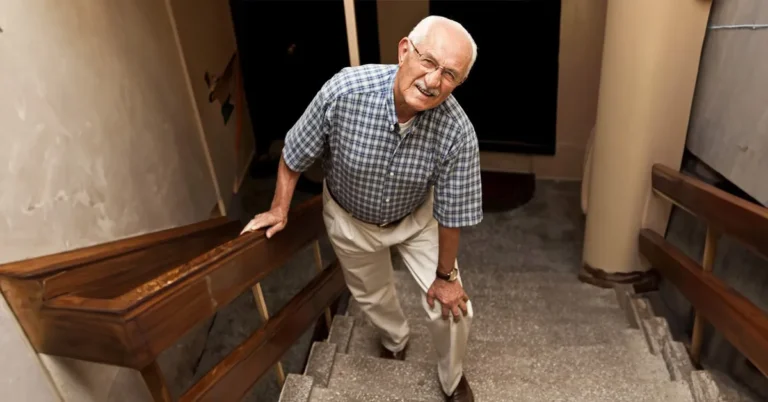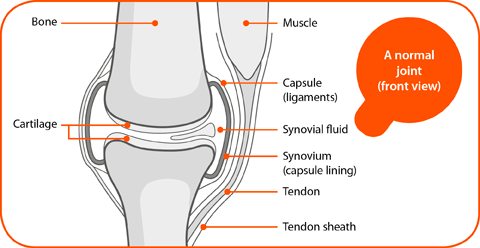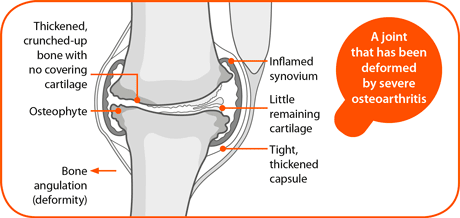Do you need a knee replacement?
Asking if you need a knee replacement might seem like an unusual question but in the last year I have had a number of patients who have done just that. Patients like to know information which helps them to make the right choices and understand the process by which a doctor may decide to offer that as a solution. So lets start at the beginning, patients are offered knee replacements for pain and disability (most commonly from osteoarthritis).
What is osteoarthritis of the knee?
As the pictures from Arthritis Research UK (above) show a normal joint has cartilage and synovial fluid to allow smooth movement between two bones. In the case of the knee it is the femur and the tibia. Unfortunately it is not possible purely with an x-ray to decide if a knee replacement is required (although it sometimes helps), this is because age related changes in the body occur on the inside as well as the outside (grey hairs, wrinkles etc). Some changes are commonly seen in most patients on x-rays whether they have pain or not. Often the opposite knee (which may have no pain) looks just the same as the painful one on x-ray. So we get internal ‘grey hairs’ in most joints and therefore doctors look for significant changes that affect the structural integrity of the joint and not just a bit of thinning cartilage or a bit of wear n tear.
So we will assume that you have had multiple episodes of knee pain, swelling and disability over a long period (say 2 years). You may have thought it had settled and then it flares up again then this may well be osteoarthritis of the knee.
What’s the first treatment approach for knee osteoarthritis?
There are four scientifically proven ways to manage osteoarthritis of the knee:
- Use appropriate medication (where possible that would be Non Steroidal Anti-inflammatory Drugs(NSAIDS) such as ibuprofen, diclofenac, naproxyn (tablets or gels both work well)). Unfortunately not everyone can use these due to their medical history so speak to your local pharmacist or GP first.
- Exercise rehabilitation – the joints like movement and exercise even when painful. But too much and you may make the symptoms worse and too little and you will have no effect. So a physiotherapist should be able to plan your rehabilitation appropriately, but be prepared for a number of weeks of hard work.
- Education and reassurance – many people are scared they will cause more damage by moving. They stop all activity and the area stiffens and becomes weak causing more problems. The latest research indicates a combination of education/reassurance and exercise in a class can help many patient manage their arthritic knee.
- Lose weight- some patients tell us they have put weight on since having knee pain and we understand how hard this can be. But the simple facts tell us for every 1 kg you lose you reduce the peak load through your knee by 2.2kg during walking. To put it another way lose 10% of your body weight and it will improve your symptoms and function by 50%! The research proves it.
So when do you need a knee replacement?
When you have tried the conservative approach above for 3-6 months and none of the secondary treatment methods such as steroid injection, bracing or more hands on physiotherapy has helped then your doctor will look at these indicators:
- Taking large amounts of pain medication over a long period of time.
- Unable to sleep well at night.
- Severely limited function (walk less than 100m, unable to climb stairs etc)
- Difficulties looking after yourself (activities of daily living) or work.
At this stage they may consider you for replacement surgery. But they also need to take into account your health (are you fit enough for surgery), your age (not that you are too old (my oldest knee replacement patient was 96!) but more that you may be young enough for them to be concerned about the future. Knee replacements don’t last forever!) and what you personally want (it is a fairly big operation and you need to agree to follow a rehabilitation plan).
After all of this a good surgeon will be able to help you to decide whether the time is right to move to joint replacement as a treatment option. They will carefully explain the risks (all surgery has risks) and the potential benefits (results are not always guaranteed).
To be assessed by one of our physiotherapists call 0131 478 4646 or book online.





